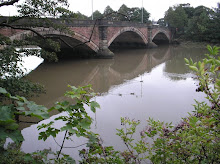"I had hardly joined our English friends when I became sensible that our cause was lost. Our numbers diminished....and at length we were cooped up by a superior force in the little town of Preston. We defended ourselves resolutely one day. On the next, the hearts of our leaders failed and they resolved to surrender at discretion. To yield myself up on such terms were to have laid my head on the block. About twenty or thirty gentlemen were of my mind. We mounted our horses and placed my daughter, who insisted on sharing my fate, in the centre of our little party. My companions, struck with her courage and filial pity, declared that they would die rather than leave her behind. We rode as a body down a street called Fishergate, which leads to a marshy ground or meadow, extending to the river Ribble, through which one of our party promised to show us a good ford. This marsh had not been strongly invested by the enemy, so that we had only an affair with a patrol of Honeywood’s dragoons, whom we dispersed and cut to pieces. We crossed the river, gained the high road to Liverpool and then dispersed to seek several places of concealment and safety."
Can there be any doubt that Sir Walter Scott had actually ridden or walked down Fishergate Hill and was familiar with the terrain before he wrote that passage from Rob Roy.
I was aware that the passage existed and thought it timely that I should devote a column and bring it to your attention. However, I couldn’t find the words during a flick through the pages. And I’m so glad that I could not. I resolved to read the book and what a story it is. The language ( though at times unintelligible ) is quite wonderful. Here’s a typical example of one of the characters:
For rather than any good action should walk through the world like an unappropriated adjective in an ill-arranged sentence, he is always willing to stand noun substantive to it himself.
The book is a quite thrilling adventure story but not, as it happens, about Rob Roy but mainly about the youth of one Francis Osbaldstone who discovers that the love of his life Diana Vernon has many dangerous secrets in her native county of Northumberland and the Highlands and Lowlands of Scotland just prior to the Jacobite Rebellion of 1715. And what a character Diana is – it is difficult to believe that this was written in 1817.
Having said that it is an adventure story it is also a brutally honest account of what life was like for Scottish people during that time. The novel was incredibly popular when it came out in three volumes and it is said that one ship travelling from Leith to London carried nothing but this book as cargo.
Robert Louis Stevenson, who loved it from childhood, regarded Rob Roy as the best novel of the greatest of all novelists and even today I think it stands with anything written over the last 200 years.
Monday, 22 November 2010
Subscribe to:
Post Comments (Atom)

















2 comments:
That's an amazing passage. That ford over the Ribble was used during the English Civil War too - I know it involves either the leader of the Scots fleeing from the parliamentarians, or vice versa. Can any local historians tell us the full story?
Perhaps there should be a monument to Rob Roy's fictional escapade, and one to the other more factual one? It would certainly be something to tell visitors to Preston about.
Where is ferry house?
Post a Comment